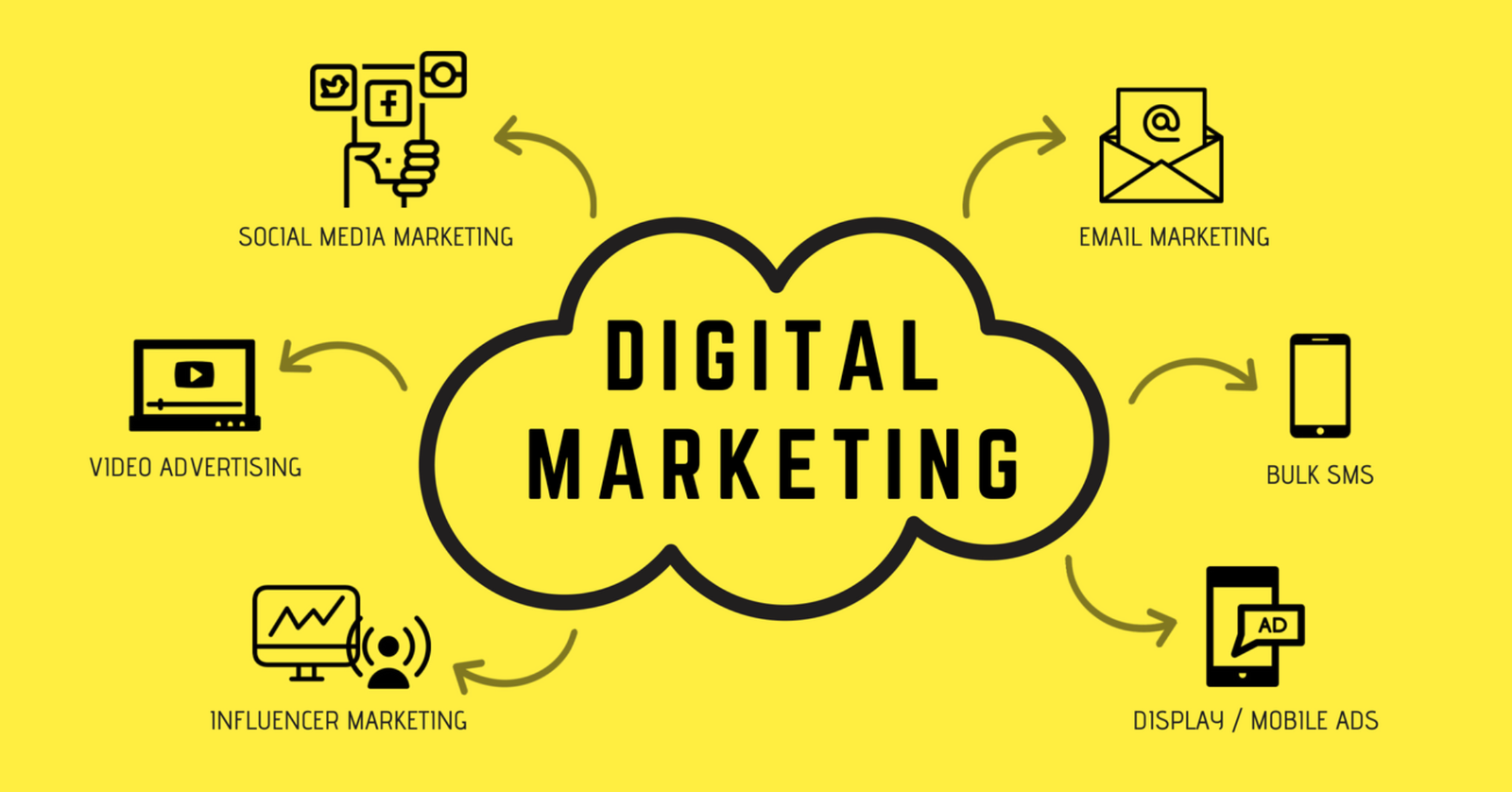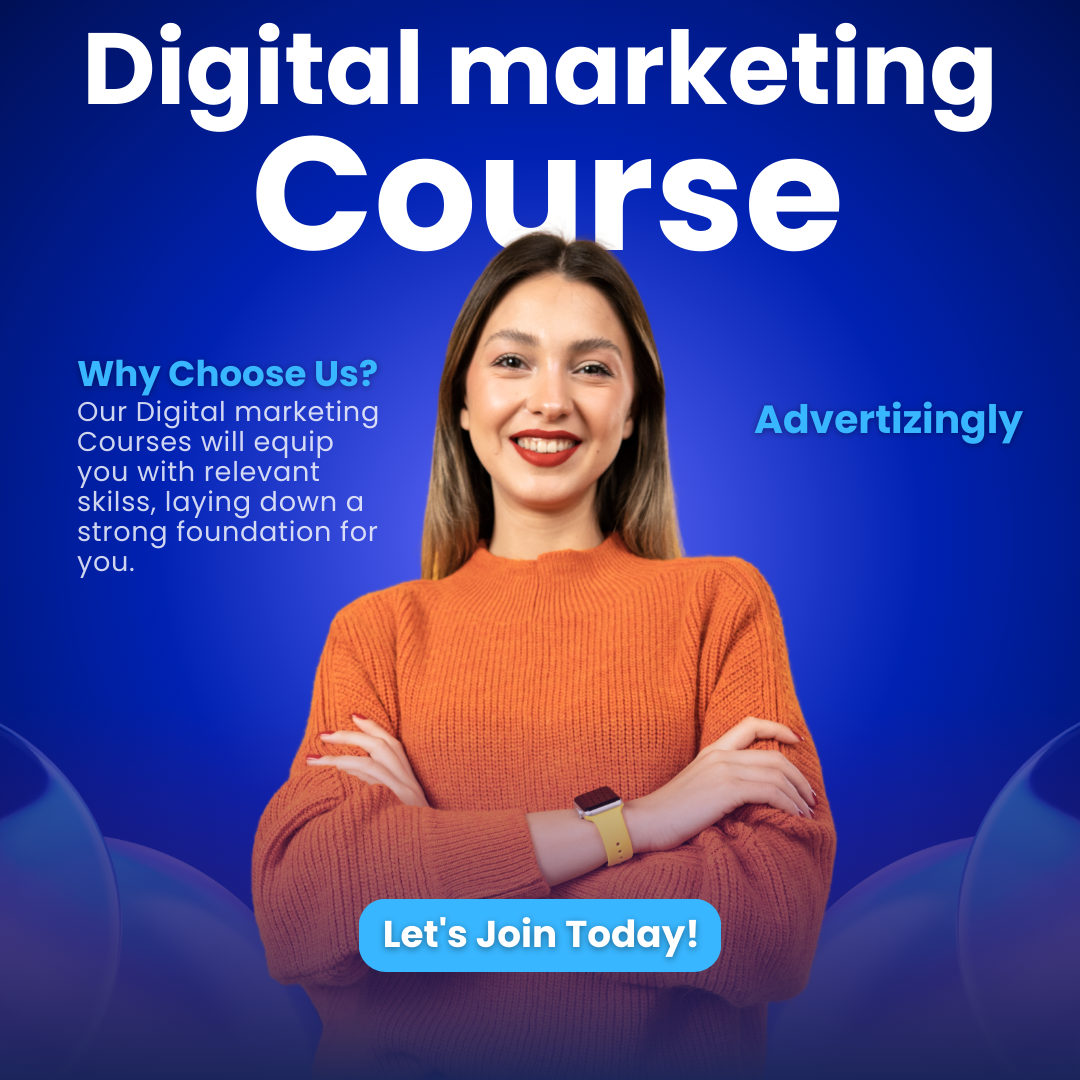Digital Marketing
It is the online and digital device-based promotion (like computers, smartphones, tablets, etc.) of your products. It comprises different forms of digital ads like online videos, search engine advertisements, social media posts, paid ads (also known as pay-per-click or PPC), and display banners.
In contrast to traditional marketing channels like print ads, billboards, or direct mail, digital marketing connects with the massive audience on the internet. Interestingly, things like television advertising often get grouped with traditional marketing, even though these strategies can overlap with digital approaches.
Fun fact: 90% of U.S. adults use the internet daily, and 41% report being online “almost constantly”! This makes having a digital presence critical. A strong online strategy is the foundation of perfect branding, unforgettable customer experiences, and the acquisition of new customers to drive business growth.
A digital marketing strategy targets your audience through various channels like social media, SEO, email marketing, and paid advertising. This way, you can reinforce your brand by providing value to customers effectively and driving engagement.
In fact, most marketers now believe that automation and AI are essential to keeping up with today’s competition. Another great aspect of digital marketing is the opportunity for automation, which simplifies meeting customer expectations.
Read more : Influencer Marketing in 2025: Why Authenticity Matters?
What Is Digital Marketing?
Digital marketing, or online marketing, is about promoting your brand using digital technologies, primarily on the internet but also through mobile phones, display advertising, and other digital media. This includes emails, social media posts, websites, SMS, and multimedia content as part of your campaigns.
Simply put, if it involves online interaction to promote your brand, it is digital marketing.
Digital Marketing vs. Inbound Marketing
Digital marketing and inbound marketing might seem similar because they utilize similar tools—email, web content, and social media all play key roles in each. However, their methods differ:
- Digital marketing focuses on converting potential customers one by one via specific online tools or channels. For example, a brand might prioritize email campaigns or a particular social media platform.
- Inbound marketing takes a more holistic approach, starting with a goal (e.g., increasing website traffic) and determining which tools (like SEO or blog content) will help achieve that goal at various stages of the sales funnel.
Both strategies work best when combined. Inbound marketing adds purpose and structure to digital efforts, ensuring every channel contributes to a specific goal.
Read more : SEO in 2025: Creating Websites That Ranks
Why Digital Marketing Matters
Digital marketing stands out among other forms of marketing due to its accessibility and cost-effectiveness. With approximately 5.45 billion internet users globally (as of July 2024), reaching your target audience online is easier than ever.
Digital marketing provides an affordable way to connect with your audience, whether through social media or email campaigns. This accessibility makes it particularly beneficial for small businesses, as it requires minimal initial investment.
B2B vs. B2C Digital Marketing
Digital marketing works for both B2B (business-to-business) and B2C (business-to-consumer) models, but their approaches differ:
- B2B marketing is logic-driven, focusing on data and building relationships. Decisions take longer and involve multiple stakeholders.
- B2C marketing is emotion-driven, focusing on quick decisions and often fueled by impulse purchases.
Whether targeting businesses or consumers, your strategy should align with the preferences and buying behaviors of your audience.
Types of Digital Marketing
Search Engine Optimization (SEO)
SEO involves optimizing your website to rank higher on search engine results pages. Key factors include high-quality content, keyword usage, mobile-friendliness, loading speed, and backlinks. The goal is to make your website visible to people searching for relevant products or services.
Content Marketing
Content marketing emphasizes crafting valuable, relevant content (e.g., blogs, videos, and infographics) to attract and engage your audience. High-quality content not only improves SEO but also builds trust and credibility.
Social Media Marketing
Social media platforms like Instagram, Facebook, and LinkedIn allow businesses to connect directly with audiences. This form of marketing is ideal for building brand awareness and fostering engagement through posts, ads, and direct interactions.
Pay-Per-Click (PPC) Advertising
PPC enables businesses to display ads on search engines or other platforms, charging only when a user clicks on the ad. Google Ads is a prominent example of PPC platforms.
Affiliate Marketing
Affiliate marketing involves partnering with affiliates who promote your products or services in exchange for a commission on sales.
Native Advertising
Native ads blend seamlessly with website or platform content, providing valuable information without being overly promotional.
Influencer Marketing
Collaborate with influencers to leverage their credibility and reach their established audience within your niche.
Marketing Automation
Automate repetitive tasks like sending emails or scheduling social media posts. Automation improves efficiency and enables personalized customer interactions.
Read more : 10 Social Media Trends For 2025
Streamline Your Work with Marketing Automation
Tools like Mailchimp offer marketing automation solutions, allowing you to engage your audience effortlessly with behavior-based automations, transactional emails, and date-based triggers.
Why Email Marketing Works
Email marketing goes beyond sending promotional messages; it’s about fostering meaningful connections. Tips for impactful email campaigns include:
- Personalizing subject lines and email bodies.
- Providing clear unsubscribe options to build trust.
- Balancing transactional and promotional content.
Leverage marketing automation to deliver targeted emails that meet customer needs. Enhance campaigns by segmenting your audience, optimizing for mobile, and conducting A/B tests.
Read more : What Is Social Media Marketing?
Mobile Marketing for a Mobile-First World
Reach your customers where they spend most of their time—their mobile devices. From SMS to app notifications, optimizing content for mobile ensures you capture attention immediately.
Advantages of Digital Marketing
Digital marketing provides cost-effective, accessible tools for businesses of all sizes to connect with and engage their target audiences, drive growth, and build long-term customer relationships.
- Global Reach: Extend your brand’s visibility across borders.
- Cost Efficiency: Reach more people with less budget than traditional ads.
- Measurable Results: Leverage analytics to track conversions, clicks, and more.
- Personalized Experiences: Use data to tailor campaigns to specific customer needs.
- Increased Engagement: Interact with customers in real-time, fostering brand loyalty.
- Immediate Conversions: Let customers act instantly through clickable content.
Read more : What is Search Engine Optimization (SEO)?
Creating a Winning Strategy
- Set SMART Goals: Define clear, actionable objectives.
- Know Your Audience: Understand their needs, habits, and preferences.
- Create a Budget: Allocate resources wisely for maximum ROI.
- Choose the Right Channels: Align platforms with your goals and audience.
- Analyze & Optimize: Refine campaigns with data insights for continuous improvement.
Grow Your Business with Digital Marketing
Digital marketing bridges the gap between your brand and its audience, offering unmatched personalization, engagement, and scalability. By leveraging its tools and techniques, you’ll unlock unparalleled growth potential.
We are a Digital Marketing Agency serving in India, USA, UK, Canada & UAE, From SEO to social media, we deliver results that boost visibility, leads, and ROI.

